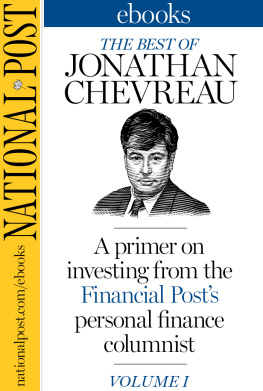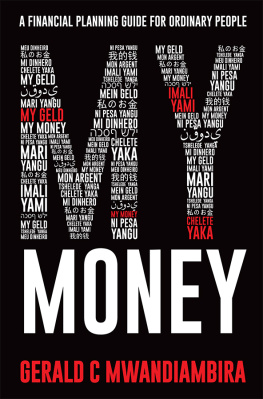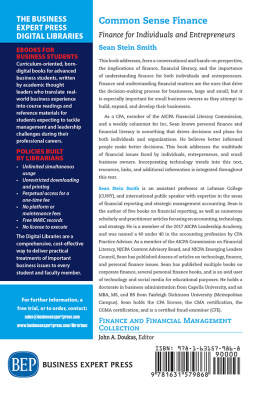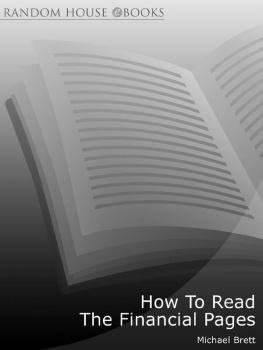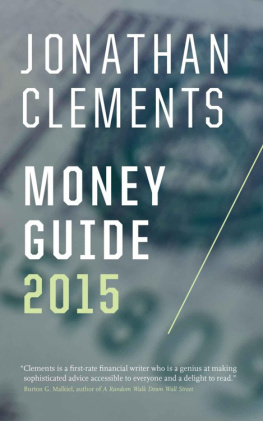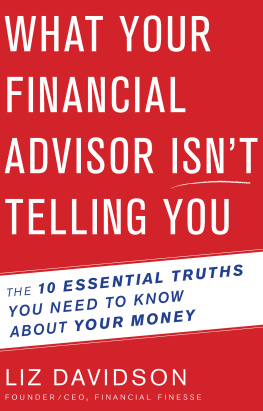Contents
PART I:
BUILDING AND PRESERVING WEALTH
PART II:
RETIREMENT AND LIVING ON YOUR WEALTH
PART III:
FINANCIAL LITERACY
Chapter 1:
How anyone can save $2,000; Dont tell me you cant afford these small savings
16 April 2011
When the Tories unveiled their plan to double contribution amounts for tax-free savings accounts, some readers questioned my assertion that low-income earners would benefit, given that many are hard-pressed to save $5,000, let alone $10,000.
Lets take a smaller amount then: I contend that absolutely anyone can save $2,000 a year. Break it into small increments and it works out to $166.67 a month. Divide it by 365, and youll find it requires cutting just $5.48 a day.
The problem is were constantly tempted to spend and seemingly trivial daily expenditures add up. Think how many blue $5 bills fly out of your wallet any given day and tell me with a straight face that every time you spend one, its absolutely necessary. But, you argue, Youre asking me to give up my luxuries or habits.
Well, yes, the cost of establishing a beneficial habit that could change your life could well mean giving up less positive habits. Just dont tell me you cant afford to save $2,000 a year. This is just an excuse and a declaration that you are more committed to todays pleasures than tomorrows freedom.
In a new book One Financial Habit That Could Change Your Life, the authors say that a 15-year-old who gets early into the savings habit and puts away $2,000 a year for the next 50 years will retire with a cushy $2.38-million nest egg.
Try adopting my motto: Freedom, not stuff! The accompanying graphics show numerous examples of stuff you could jettison in order to achieve financial freedom. Giving up any one of the bigger items would get you close to $2,000 a year, or you could find the savings by cutting back on several smaller habits, like a $5-per-week ($240 per year) fling on lottery tickets or a $1.59 daily chocolate bar.
To pull this off, you must adopt an attitude I call Guerrilla Frugality, meaning you must view the fight to save money as an ongoing act of guerrilla warfare.
In his financial novel, Financial Freedom Without Sacrifice, financial educator Talbot Stevens describes how a pack-a-day teenage smoker could have $5.8-million at age 65 by giving it up. If you smoke a pack of cigarettes a day ($9.75), cutting back by two-thirds could alone net you $2,000 a year.
I use a similar example in my own book, Findependence Day. The frugal host of a fictional financial reality TV show points in frustration at her TV audience and yells, THEY are not converted. THEY keep buying lottery tickets, booze, junk food, candy, cigarettes and waste a small fortune. Then they complain theyre too poor to pay off their credit cards.
Credit cards are a good example. I blush to admit that in my own misspent youth, I often carried a $500 balance into the next month, thinking nothing of paying $40 per month in interest. Eventually, I realized that it could be used to buy two records a month if I could refrain from buying CDs long enough to pay off the credit cards in full within the 30-day grace period. Thats what I ultimately did. Later, when I had a mortgage, applying the same reasoning saved tens of thousands of dollars by pre-paying it as quickly as possible.
If you stop buying a case of beer a week, youd be three quarters of the way toward your $2,000 saving goal. Youd be close to it just by brown-bagging it instead of eating a Big Mac meal every day. If you are a two-car family, giving up one of them might net you the $2,000 from savings on car insurance, gas and maintenance.
Or how about the small fortune spent on technology and media? You could save $750 a year by cutting a full package of cable TV channels, or save half that by cutting down to just basic cable. Or if you buy books and magazines, you could instead get them free at the library. (Kids, ask your parents what that is.)
The truth is, there are literally hundreds of ways dedicated penny-pinchers can save money. Just dont complain you cant save $2,000 a year.
DO YOU SMOKE?
If you smoke a pack of cigarettes a day (at $9.75 a pack) you could save $3,276 a year if you quit. Cut the habit by two-thirds and you have your $2,000.
DO YOU DRINK?
Stop buying a case of beer a week and youll save $1,440 a year. Skipping the weekly bottle of $10 wine for a year will get you to $2,000.
DO YOU FAIL TO PAY YOUR CREDIT CARD?
Someone owing $12,000 on a credit card with 18% interest pays almost $2,000 a year in interest if they only pay the minimum 3% outstanding balance each month, says Visa Canada.
ARE YOU DRIVING TWO CARS?
A married couple age 30 with two luxury cars could save $1,615 in car insurance by dropping one, says Kanetix.ca. Another $418 could be saved simply by comparison shopping for the best rates.
DO YOU EAT FAST FOOD?
A Big Mac meal at McDonalds costs $7.50. If you eat one every day, it costs $1,800 a year.
OTHER VICES?
A daily Starbucks latte costs $960 a year and deluxe cable TV service may cost $747. Add to this $5-a-week-savings from lottery tickets or stop buying a daily candy bar for $1.57 and you can easily reach $2,000. You could live without all of these smaller items.
Chapter 2:
Planners should make plans; Not everyone gets a robust financial plan
22 October 2011
A considerable majority 61% of Canadians aged 45 to 64 dont have a formal financial plan in place, according to a TD Waterhouse poll released this week.
When I see industry surveys like that, I assume the fault lies with the individuals rather than their advisors. After all, when asked why they dont have a plan, 50% told TD they just havent gotten around to creating one.
But after attending this weeks Vision 2020 symposium hosted by the guardians of the certified financial planner designation I was surprised to hear that even CFPs dont routinely create comprehensive plans for their clients.
Early in Wednesdays event sponsored by the Financial Planning Standards Council, the moderator posed a simple question to four panelists: Does every client get a financial plan?
No, replied Stephen Ison, a principal at Edward Jones. The majority of our advisors are still evolving to seeing this thing as an objective, along with the changing desires of clients.
No, not everyone gets a robust financial plan, said CFP Jason Round of Royal Bank of Canada. My sense is not every client needs one but all get a form of advice tailored to them.
Not everyone gets a financial plan, said Kim Thompson, senior vice-president of Credential Financial Inc. The initial focus is on understanding client needs, which may eventually lead to a full financial plan depending on needs, complexity and investable assets.
The fourth was a consultant to various financial institutions. There are lots of ways to define what constitutes a financial plan, said Amy Young, principal with Upside Consulting Group Inc. Different terms describe the process and there are a wide range of outputs from asking for a financial planning exercise.
Typically, she sees documents with cover pages showing a clients name in big letters and the words Your financial plan. But inside, the document is simply an asset allocation recommendation with no indication of goals, timelines or even risk profiling. That concerns me.
Consumers seldom know the difference. If the document says Your financial plan on the front, they think its covered. The technical quality of the financial plan can be quite poor ... Id argue they havent gotten what they need.

